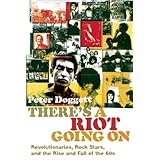
Average Reviews:

(More customer reviews)In taking a line from The Beach Boys' `Student Demonstration Time'- to name but one reference - as its title, author Doggett makes it clear his massive tome is directed at describing the relationship between what I will call popular music and the multi-headed beast of socio-economic-political action. It's not a new topic, nor is it a topic not already in the consciousness of many - if not most folks. Music has always been a medium discourse - both pro and con. It is also part of the fabric of our lives as a means to expression, both individually and in groups. The issue of what music means - both as a manifestation of our culture and as a tool of change - has also been addressed before; some of Ian Whitcomb's books come to mind immediately.
What Doggett has done is take the period from roughly 1950 to 1975 and provide a narrative history of how music and - more importantly - the musicians were involved in the politics of change taking place. So, it is really much more a story of the music industry and its participants than a history of change.
What we find is not surprising in that those involved, more often than not, had their own agenda. In fact, often these self-interests were at odds or even totally opposed to the events. Bob Dylan never became the anti-war/antiestablishment leader that his iconic stature implied. John Lennon may have sang "Women are the [......] of the world," but his actions indicated that his heart (maybe [....] is a better choice of words) lay in maintaining and enjoying a feminine-servile condition. In fact, Doggett repeatedly complains - to the point of carping - that misogynistic attitudes permeated the music scene and its spillover into politics.
None of this should have been surprising to Doggett or anyone else, for that matter, as books, films, plays, songs, newspaper and reality television have all addressed this issue. Yes, there are exceptions; there always are. But, this period in rock 'n' roll - a period before Heart, Hole, The Runaways, Fanny, The Slits and Madonna - was a male playland.
To make the failure of our music idols to embrace the "revolution" the centerpiece of a book this sprawling is an exercise in the self-obvious. There are better ways to learn about the history of this period. What happenhs here is that the author castigates failure to live up to the dogma and doctrines of revolution. How could you excpect otherwise from a medium like popular music where excess is applauded?
Click Here to see more reviews about: There's a Riot Going On: Revolutionaries, Rock Stars, and the Rise and Fall of the '60s
Between 1965 and 1972, students and other political activists around the globe prepared to mount a revolution. While the Vietnam War raged, calls for black power grew louder and liberation movements erupted everywhere from Berkeley, Detroit, and Newark, to Paris, Berlin, Ghana, and Peking. Rock and soul music fueled this revolutionary movement with anthems and iconic imagery. Soon the musicians themselves, from John Lennon and Bob Dylan to James Brown and Fela Kuti, were being dragged into the fray. Some joined the protestors on the barricades; some were persecuted for their political activism; some abandoned the cause and were dismissed as counter-revolutionaries. From Mick Jagger's legendary appearance in Grosvenor Square, standing on the sidelines and snapping pictures, to the infamous incident at Woodstock when Pete Townshend kicked Yippie Abbie Hoffman off the stage while he tried to make a speech about an imprisoned comrade, to Lennon's display of self-promotion when he auctioned off his hair on top of the "Black House," Doggett unravels the truth about how these ambitious musicians weren't always the "Street Fighting Men" they saw themselves as. There's A Riot Going On is a rich, fact-filled, exceedingly well-researched social history at the nexus of pop culture, celebrity, and politics.

0 comments:
Post a Comment